Charles E W Bean, Diaries, AWM38 3DRL 606/268/1 - 1917 - 1936 - Part 3
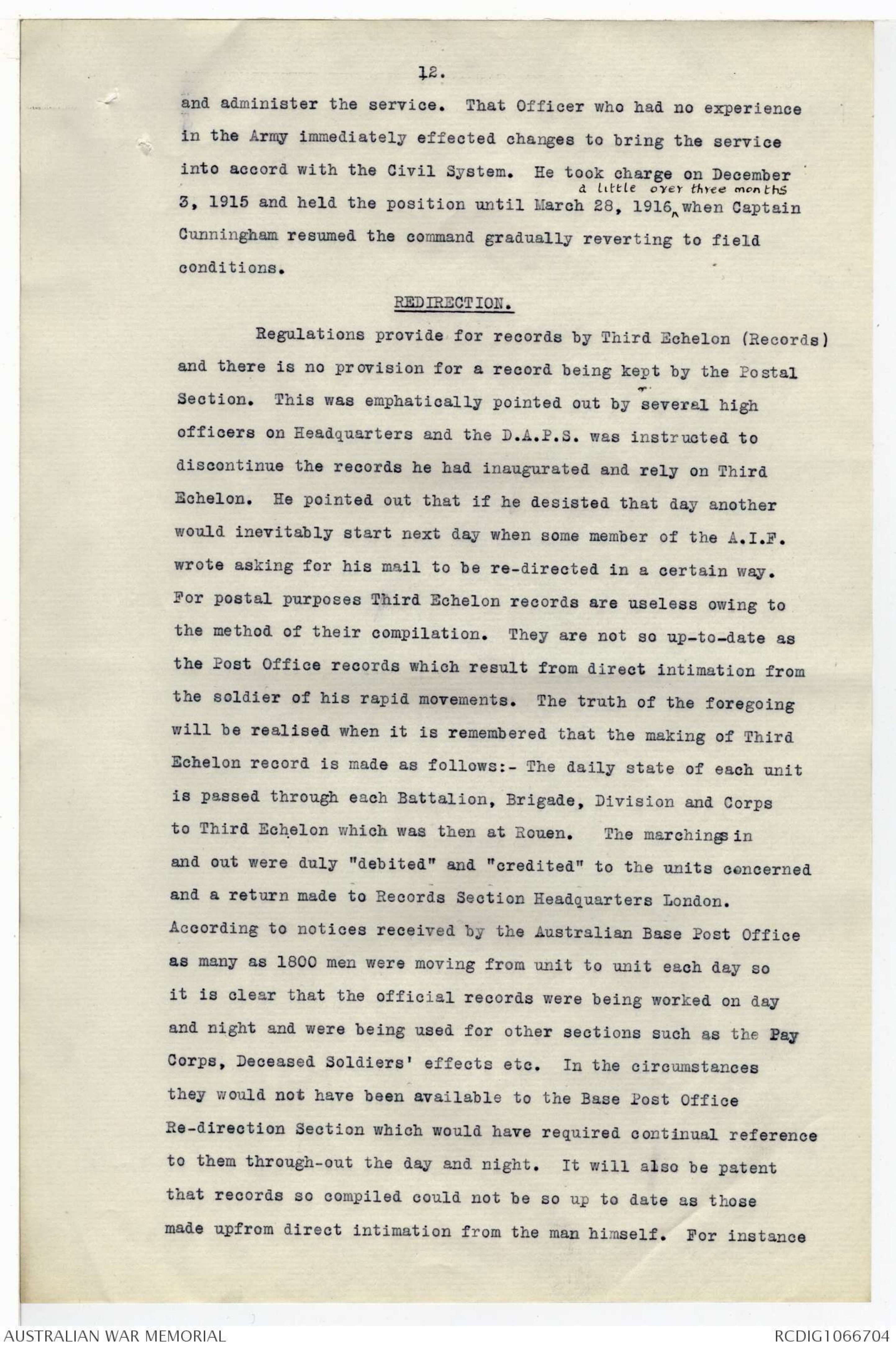
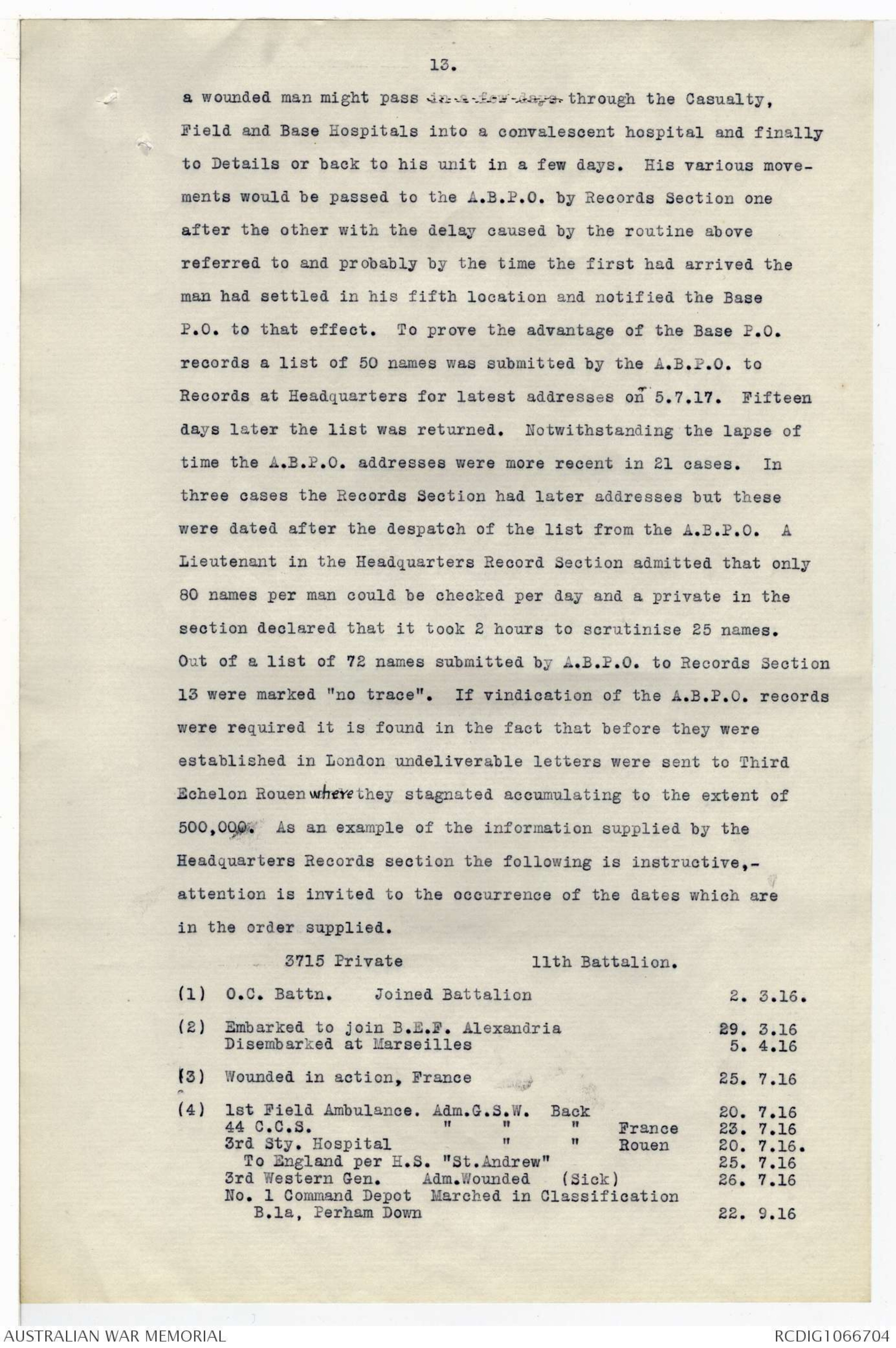
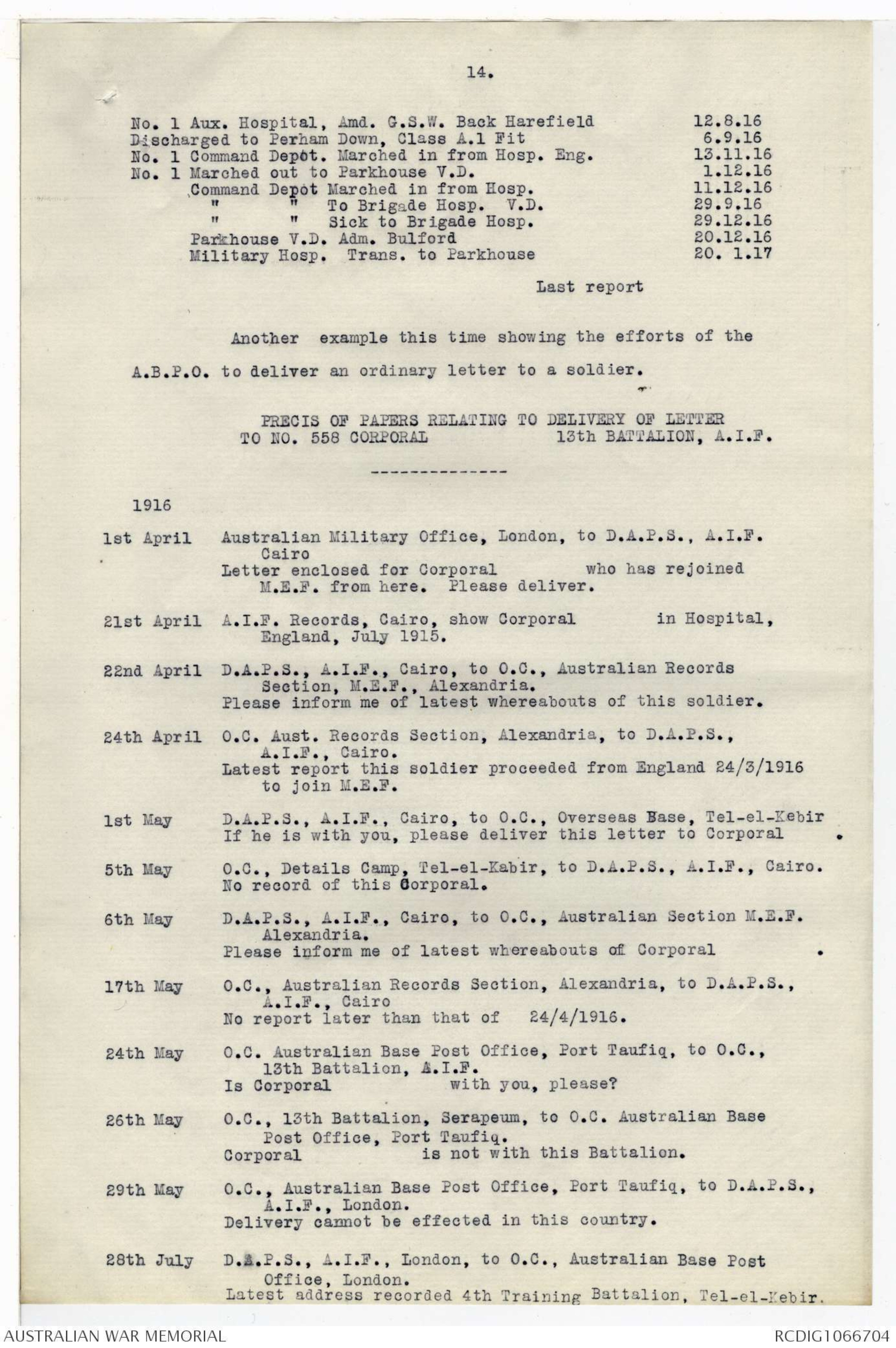
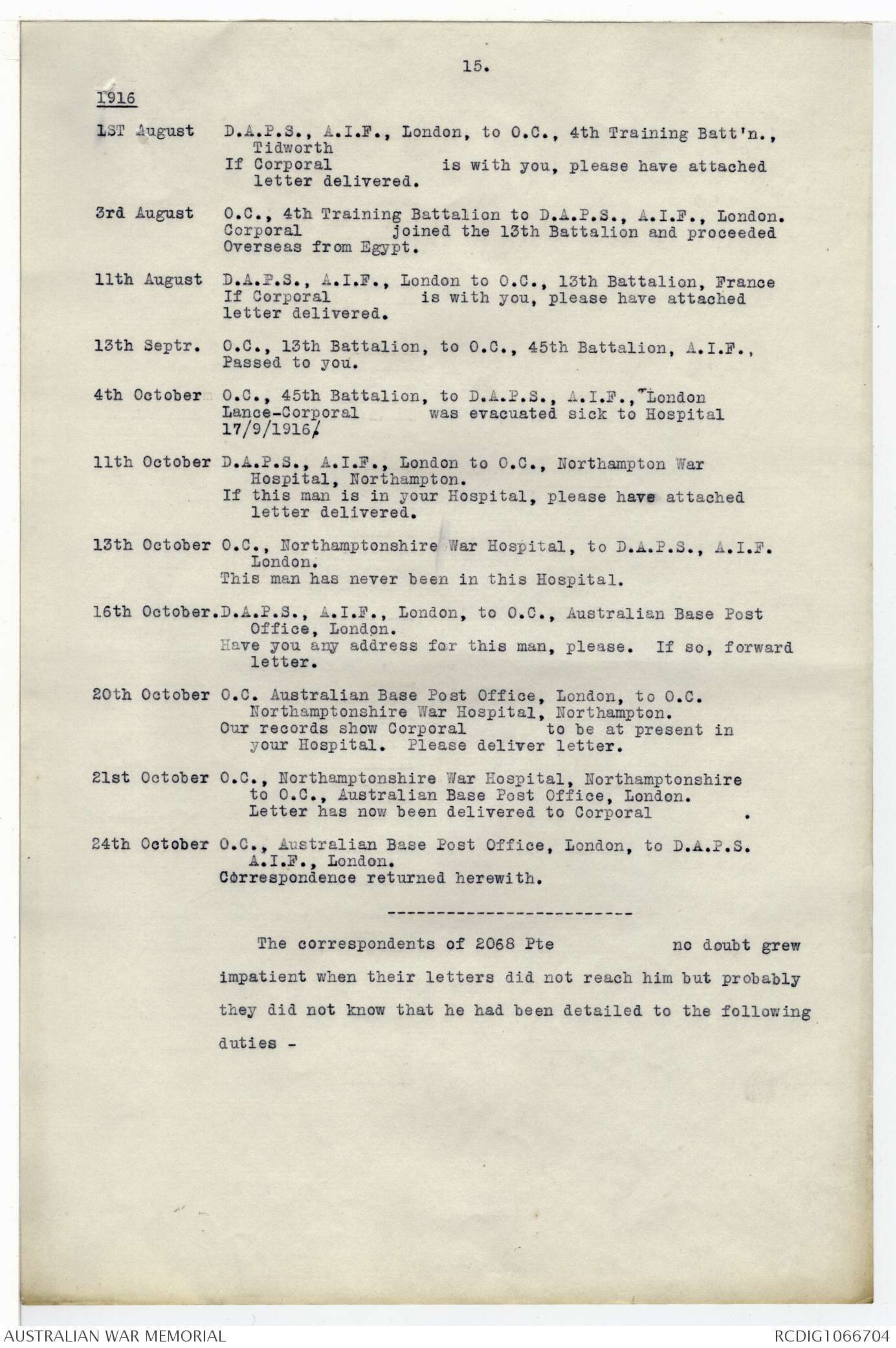
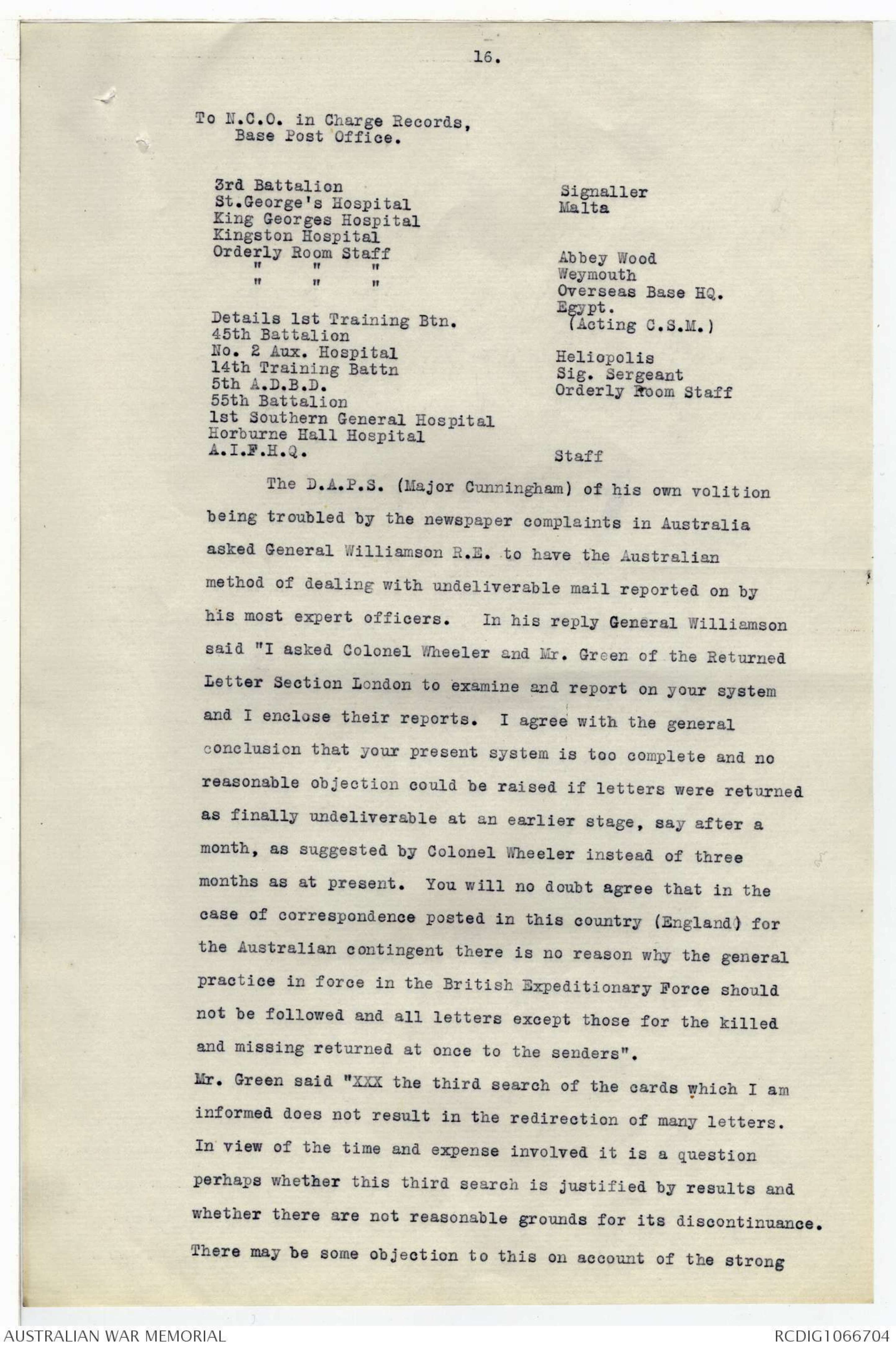
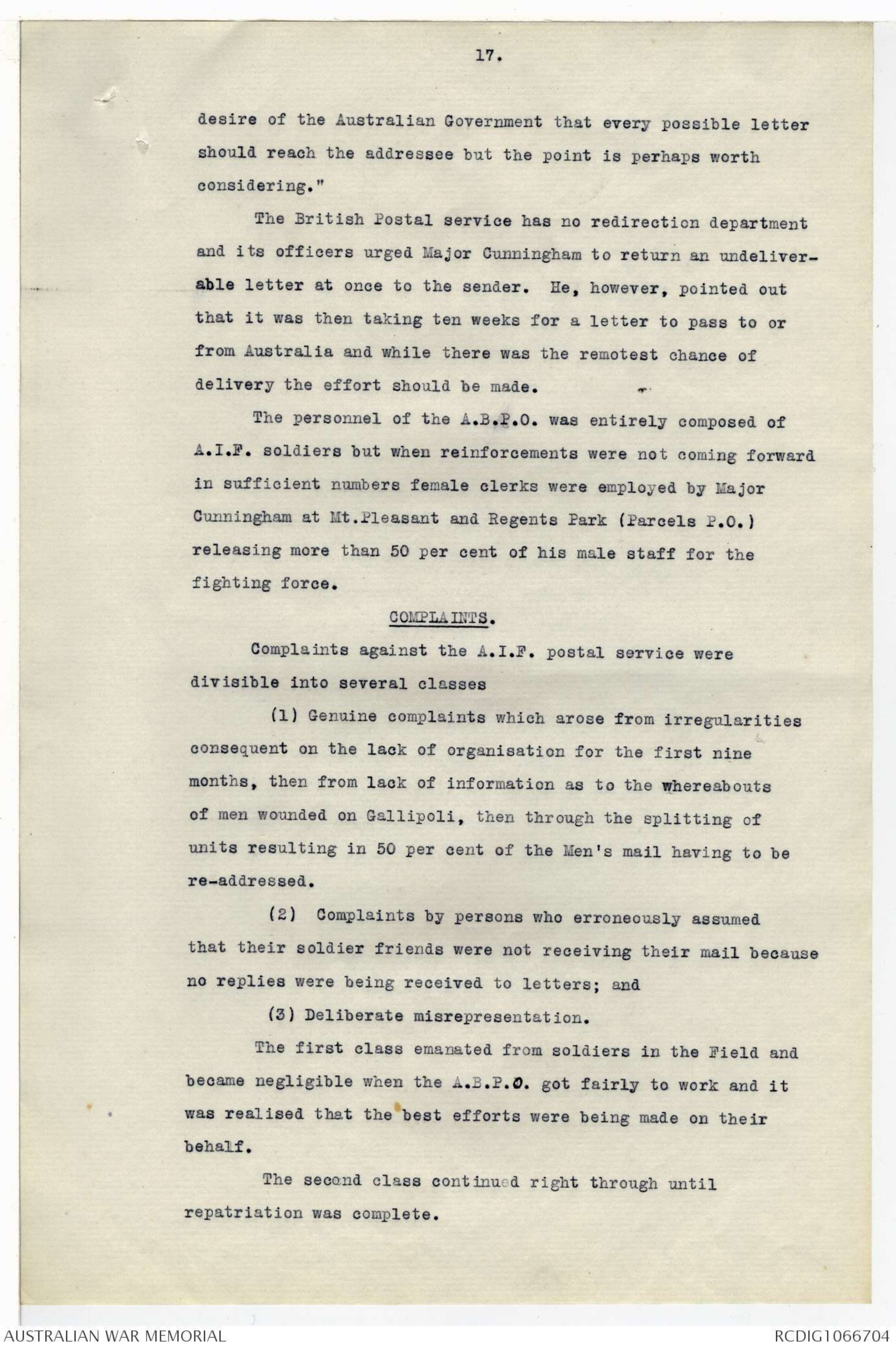
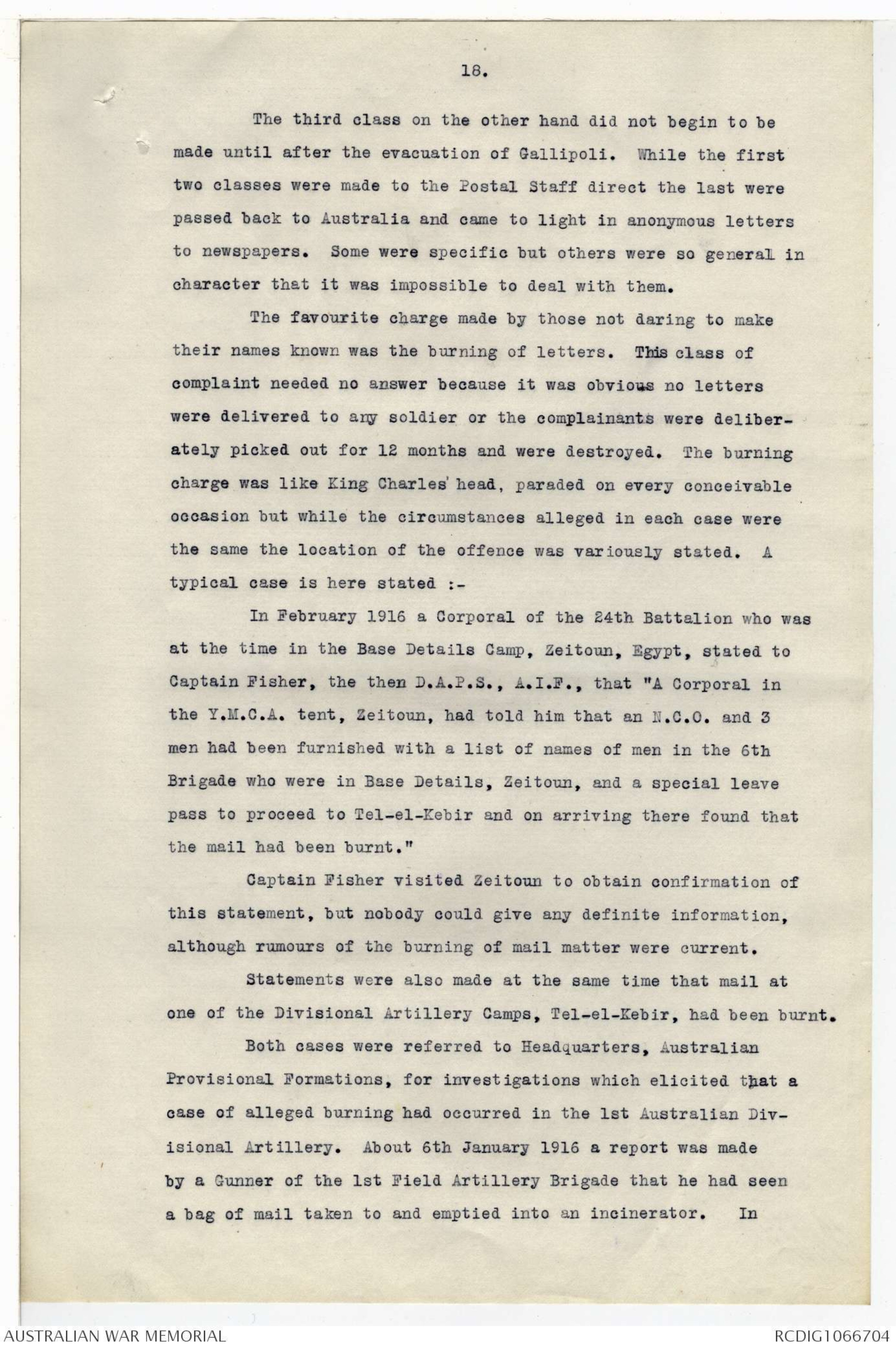
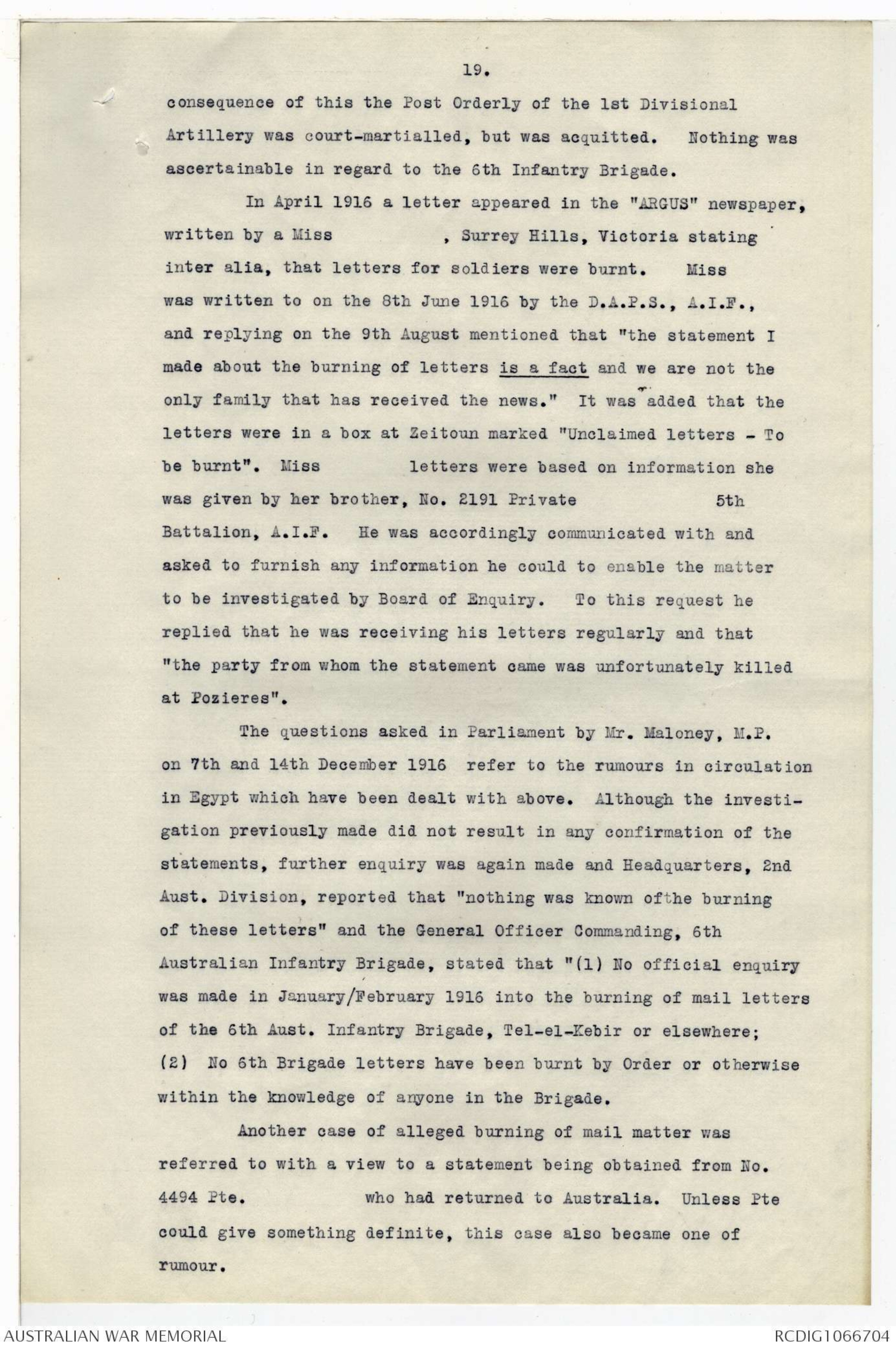
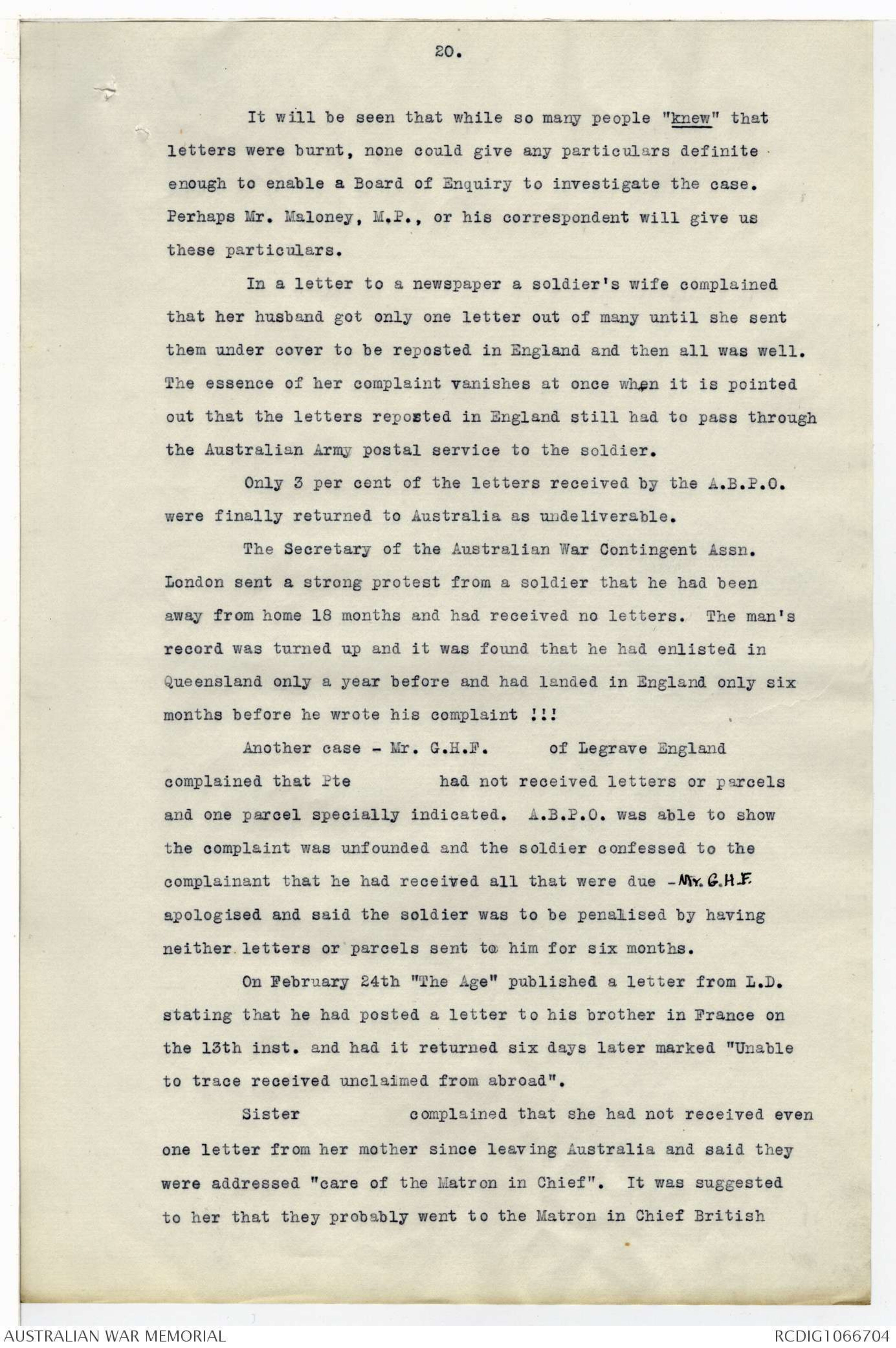
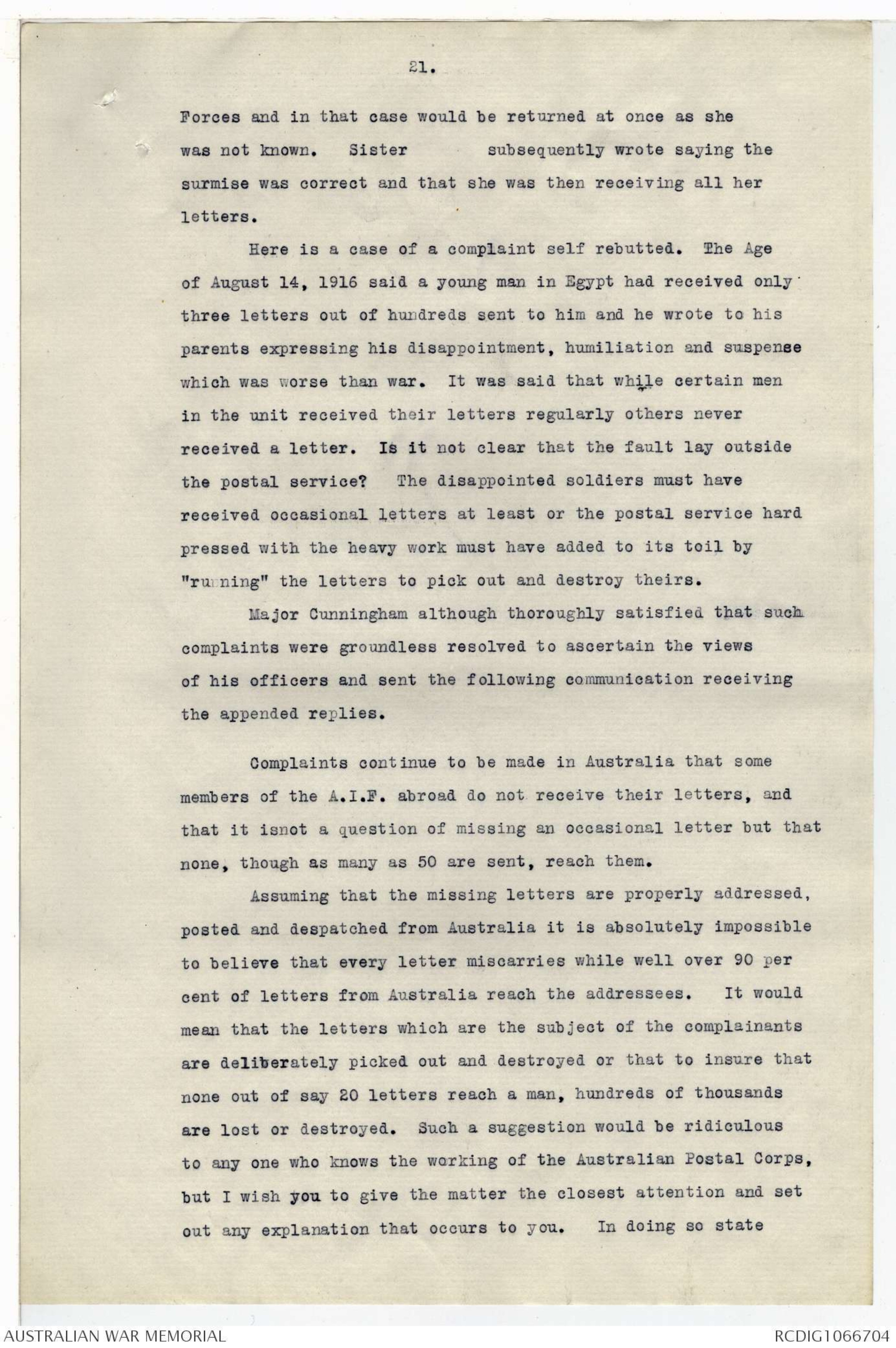
12.
and administer the service. That Officer who had no experience
in the Army immediately effected changes to bring the service
into accord with the Civil System. He took charge on December
3, 1915 and held the position until March 28, 1916, ^a little over three months when Captain
Cunningham resumed the command gradually reverting to field
conditions.
REDIRECTION.
Regulations provide for records by Third Echelon (Records)
and there is no provision for a record being kept by the Postal
Section. This was emphatically pointed out by several high
officers on Headquarters and the D.A.P.S. was instructed to
discontinue the records he had inaugurated and rely on Third
Echelon. He pointed out that if he desisted that day another
would inevitably start next day when some member of the A.I.F.
wrote asking for his mail to be re-directed in a certain way.
For postal purposes Third Echelon records are useless owing to
the method of their compilation. They are not so up-to-date as
the Post Office records which result from direct intimation from
the soldier of his rapid movements. The truth of the foregoing
will be realised when it is remembered that the making of Third
Echelon record is made as follows:- The daily state of each unit
is passed through each Battalion, Brigade, Division and Corps
to Third Echelon which was then at Rouen. The marchings in
and out were duly "debited" and "credited" to the units concerned
and a return made to Records Section Headquarters London.
According to notices received by the Australian Base Post Office
as many as 1800 men were moving from unit to unit each day so
it is clear that the official records were being worked on day
and night and were being used for other sections such as the Pay
Corps, Deceased Soldiers' effects etc. In the circumstances
they would not have been available to the Base Post Office
Re-direction Section which would have required continual reference
to them through-out the day and night. It will also be patent
that records so compiled could not be so up to date as those
made upfrom direct intimation from the man himself. For instance
13.
a wounded man might pass in a few days through the Casualty,
Field and Base Hospitals into a convalescent hospital and finally
to Details or back to his unit in a few days. His various movements
would be passed to the A.B.P.O. by Records Section one
after the other with the delay caused by the routine above
referred to and probably by the time the first had arrived the
man had settled in his fifth location and notified the Base
P.O. to that effect. To prove the advantage of the Base P.O.
records a list of 50 names was submitted by the A.B.P.O. to
Records at Headquarters for latest addresses on 5.7.17. Fifteen
days later the list was returned. Notwithstanding the lapse of
time the A.B.P.O. addresses were more recent in 21 cases. In
three cases the Records Section had later addresses but these
were dated after the despatch of the list from the A.B.P.O. A
Lieutenant in the Headquarters Record Section admitted that only
80 names per man could be checked per day and a private in the
section declared that it took 2 hours to scrutinise 25 names.
Out of a list of 72 names submitted by A.B.P.O. to Records Section
13 were marked "no trace". If vindication of the A.B.P.O. records
were required it is found in the fact that before they were
established in London undeliverable letters were sent to Third
Echelon Rouen where they stagnated accumulating to the extent of
500,000. As an example of the information supplied by the
Headquarters Records section the following is instructive,-
attention is invited to the occurrence of the dates which are
in the order supplied.
3715 Private 11th Battalion.
| (1) | O.C. Battn. Joined Battalion | 2. 3.16. |
| (2) | Embarked to join B.E.F. Alexandria | 29. 3.16 |
| Disembarked at Marseilles | 5. 4.16 | |
| (3) | Wounded in action, France | 25. 7.16 |
| (4) | 1st Field Ambulance. Adm.G.S.W. Back | 20. 7.16 |
| 44 C.C.S. " " " France | 23. 7.16 | |
| 3rd Sty. Hospital " " Rouen To England per H.S. "St Andrew" 3rd Western Gen. Adm.Wounded (Sick) |
20. 7.16. 25. 7.16 26. 7.16 |
|
| No. 1 Command Depot Marched in Classification | ||
| B. 1a, Perham Down | 22. 9.16 |
14.
| No. 1 Aux. Hospital, Amd. G.S.W. Back Harefield Discharged to Perham Down, Class A.1 Fit No. 1 Command Depot. Marched in from Hosp. Eng. No. 1 Marched out to Parkhouse V.D. |
12.8.16 6.9.16 13.11.16 1.12.16 |
|
| Command Depot Marched in from Hosp. " " To Brigade Hosp. V.D. " " Sick to Brigade Hosp. Parkhouse V.D. Adm. Bulford Military Hosp. Trans. to Parkhouse |
11.12.16 29.9.16 29.12.16 20.12.16 20. 1.17 |
|
Last report
Another example this time showing the efforts of the
A.B.P.O. to deliver an ordinary letter to a soldier.
PRECIS OF PAPERS RELATING TO DELIVERY OF LETTER
TO NO. 558 CORPORAL 13th BATTALION, A.I.F.
1916
1st April Australian Military Office, London, to D.A.P.S., A.I.F.
Cairo
Letter enclosed for Corporal who has rejoined
M.E.F. from here. Please deliver.
21st April A.I.F. Records, Cairo, show Corporal in Hospital,
England, July 1915.
22nd April D.A.P.S., A.I.F., Cairo, to O.C., Australian Records
Section, M.E.F., Alexandria.
Please inform me of latest whereabouts of this soldier.
24th April O.C. Aust. Records Section, Alexandria, to D.A.P.S.,
A.I.F., Cairo.
Latest report this soldier proceeded from England 24/3/1916
to join M.E.F.
1st May D.A.P.S., A.I.F., Cairo, to O.C., Overseas Base, Tel-el-Kebir
If he is with you, please deliver this letter to Corporal.
5th May O.C., Details Camp, Tel-el-Kabir, to D.A.P.S., A.I.F., Cairo.
No record of this Corporal.
6th May D.A.P.S., A.I.F., Cairo, to O.C., Australian Section M.E.F.
Alexandria.
Please inform me of latest whereabouts of Corporal.
17th May O.C., Australian Records Section, Alexandria, to D.A.P.S.,
A.I.F., Cairo
No report later than that of 24/4/1916.
24th May O.C. Australian Base Post Office, Port Taufiq, to O.C.,
13th Battalion, A.I.F.
Is Corporal with you, please?
26th May O.C., 13th Battalion, Serapeum, to O.C. Australian Base
Post Office, Port Taufiq.
Corporal is not with this Battalion.
29th May O.C., Australian Base Post Office, Port Taufiq, to D.A.P.S.,
A.I.F., London.
Delivery cannot be effected in this country.
28th July D.A.P.S., A.I.F., London, to O.C., Australian Base Post
Office, London.
Latest address recorded 4th Training Battalion, Tel-el-Kebir.
15.
1916
1ST August D.A.P.S., A.I.F., London, to O.C., 4th Training Batt'n.,
Tidworth
If Corporal is with you, please have attached
letter delivered.
3rd August O.C., 4th Training Battalion to D.A.P.S., A.I.F., London.
Corporal joined the 13th Battalion and proceeded
Overseas from Egypt.
11th August D.A.P.S., A.I.F., London to O.C., 13th Battalion, France
If Corporal is with you, please have attached
letter delivered.
13th Septr. O.C., 13th Battalion, to O.C., 45th Battalion, A.I.F.,
Passed to you.
4th October O.C., 45th Battalion, to D.A.P.S., A.I.F., London
Lance-Corporal was evacuated sick to Hospital
17/9/1916/.
11th October D.A.P.S., A.I.F., London to O.C., Northampton War
Hospital, Northampton.
If this man is in your Hospital, please have attached
letter delivered.
13th October O.C., Northamptonshire War Hospital, to D.A.P.S., A.I.F.
London.
This man has never been in this Hospital.
16th October. D.A.P.S., A.I.F., London, to O.C., Australian Base Post
Office, London.
Have you any address for this man, please. If so, forward
letter.
20th October O.C. Australian Base Post Office, London, to O.C.
Northamptonshire War Hospital, Northampton.
Our records show Corporal to be at present in
your Hospital. Please deliver letter.
21st October O.C., Northamptonshire War Hospital, Northamptonshire
to O.C., Australian Base Post Office, London.
Letter has now been delivered to Corporal.
24th October O.C., Australian Base Post Office, London, to D.A.P.S.
A.I.F., London.
Correspondence returned herewith.
The correspondents of 2068 Pte no doubt grew
impatient when their letters did not reach him but probably
they did not know that he had been detailed to the following
duties -
16.
To N.C.O. in Charge Records,
Base Post Office.
| 3rd Battalion | Signaller |
| St. George's Hospital | Malta |
| King Georges Hospital Kingston Hospital |
|
| Orderly Room Staff " " " " " " |
Abbey Wood Weymouth Overseas Base HQ. |
| Egypt. | |
| Details 1st Training Btn. | (Acting C.S.M.) |
| 45th Battalion | |
| No. 2 Aux. Hospital 14th Training Battn 5th A.D.B.D. |
Heliopolis Sig. Sergeant Orderly Room Staff |
| 55th Battalion 1st Southern General Hospital Horburne Hall Hospital |
|
| A.I.F.H.Q. | Staff |
The D.A.P.S. (Major Cunningham) of his own volition
being troubled by the newspaper complaints in Australia
asked General Williamson R.E. to have the Australian
method of dealing with undeliverable mail reported on by
his most expert officers. In his reply General Williamson
said "I asked Colonel Wheeler and Mr. Green of the Returned
Letter Section London to examine and report on your system
and I enclose their reports. I agree with the general
conclusion that your present system is too complete and no
reasonable objection could be raised if letters were returned
as finally undeliverable at an earlier stage, say after a
month, as suggested by Colonel Wheeler instead of three
months as at present. You will no doubt agree that in the
case of correspondence posted in this country (England) for
the Australian contingent there is no reason why the general
practice in force in the British Expeditionary Force should
not be followed and all letters except those for the killed
and missing returned at once to the senders".
Mr. Green said "XXX the third search of the cards which I am
informed does not result in the redirection of many letters.
In view of the time and expense involved it is a question
perhaps whether this third search is justified by results and
whether there are not reasonable grounds for its discontinuance.
There may be some objection to this on account of the strong
17.
desire of the Australian Government that every possible letter
should reach the addressee but the point is perhaps worth
considering."
The British Postal service has no redirection department
and its officers urged Major Cunningham to return an undeliverable
letter at once to the sender. He, however, pointed out
that it was then taking ten weeks for a letter to pass to or
from Australia and while there was the remotest chance of
delivery the effort should be made.
The personnel of the A.B.P.O. was entirely composed of
A.I.F. soldiers but when reinforcements were not coming forward
in sufficient numbers female clerks were employed by Major
Cunningham at Mt. Pleasant and Regents Park (Parcels P.O.)
releasing more than 50 per cent of his male staff for the
fighting force.
COMPLAINTS.
Complaints against the A.I.F. postal service were
divisible into several classes
(1) Genuine complaints which arose from irregularities
consequent on the lack of organisation for the first nine
months, then from lack of information as to the whereabouts
of men wounded on Gallipoli, then through the splitting of
units resulting in 50 per cent of the Men's mail having to be
re-addressed.
(2) Complaints by persons who erroneously assumed
that their soldier friends were not receiving their mail because
no replies were being received to letters; and
(3) Deliberate misrepresentation.
The first class emanated from soldiers in the Field and
became negligible when the A.B.P.O. got fairly to work and it
was realised that the best efforts were being made on their
behalf.
The second class continued right through until
repatriation was complete.
18.
The third class on the other hand did not begin to be
made until after the evacuation of Gallipoli. While the first
two classes were made to the Postal Staff direct the last were
passed back to Australia and came to light in anonymous letters
to newspapers. Some were specific but others were so general in
character that it was impossible to deal with them.
The favourite charge made by those not daring to make
their names known was the burning of letters. This class of
complaint needed no answer because it was obvious no letters
were delivered to any soldier or the complainants were deliberately
picked out for 12 months and were destroyed. The burning
charge was like King Charles' head, paraded on every conceivable
occasion but while the circumstances alleged in each case were
the same the location of the offence was variously stated. A
typical case is here stated :-
In February 1916 a Corporal of the 24th Battalion who was
at the time in the Base Details Camp, Zeitoun, Egypt, stated to
Captain Fisher, the then D.A.P.S., A.I.F., that "A Corporal in
the Y.M.C.A. tent, Zeitoun, had told him that an N.C.O. and 3
men had been furnished with a list of names of men in the 6th
Brigade who were in Base Details, Zeitoun, and a special leave
pass to proceed to Tel-el-Kebir and on arriving there found that
the mail had been burnt."
Captain Fisher visited Zeitoun to obtain confirmation of
this statement, but nobody could give any definite information,
although rumours of the burning of mail matter were current.
Statements were also made at the same time that mail at
one of the Divisional Artillery Camps, Tel-el-Kebir, had been burnt.
Both cases were referred to Headquarters, Australian
Provisional Formations, for investigations which elicited that a
case of alleged burning had occurred in the 1st Australian Divisional
Artillery. About 6th January 1916 a report was made
by a Gunner of the 1st Field Artillery Brigade that he had seen
a bag of mail taken to and emptied into an incinerator. In
19.
consequence of this the Post Orderly of the 1st Divisional
Artillery was court-martialled, but was acquitted. Nothing was
ascertainable in regard to the 6th Infantry Brigade.
In April 1916 a letter appeared in the "ARGUS" newspaper,
written by a Miss , Surrey Hills, Victoria stating
inter alia, that letters for soldiers were burnt. Miss
was written to on the 8th June 1916 by the D.A.P.S., A.I.F.,
and replying on the 9th August mentioned that "the statement I
made about the burning of letters is a fact and we are not the
only family that has received the news." It was added that the
letters were in a box at Zeitoun marked "Unclaimed letters - To
be burnt". Miss letters were based on information she
was given by her brother, No. 2191 Private 5th
Battalion, A.I.F. He was accordingly communicated with and
asked to furnish any information he could to enable the matter
to be investigated by Board of Enquiry. To this request he
replied that he was receiving his letters regularly and that
"the party from whom the statement came was unfortunately killed
at Pozieres".
The questions asked in Parliament by Mr. Maloney, M.P.
on 7th and 14th December 1916 refer to the rumours in circulation
in Egypt which have been dealt with above. Although the investigation
previously made did not result in any confirmation of the
statements, further enquiry was again made and Headquarters, 2nd
Aust. Division, reported that "nothing was known ofthe burning
of these letters" and the General Officer Commanding, 6th
Australian Infantry Brigade, stated that "(1) No official enquiry
was made in January/February 1916 into the burning of mail letters
of the 6th Aust. Infantry Brigade, Tel-el-Kebir or elsewhere;
(2) No 6th Brigade letters have been burnt by Order or otherwise
within the knowledge of anyone in the Brigade.
Another case of alleged burning of mail matter was
referred to with a view to a statement being obtained from No.
4494 Pte. who had returned to Australia. Unless Pte
could give something definite, this case also became one of
rumour.
20.
It will be seen that while so many people "knew" that
letters were burnt, none could give any particulars definite
enough to enable a Board of Enquiry to investigate the case.
Perhaps Mr. Maloney, M.P., or his correspondent will give us
these particulars.
In a letter to a newspaper a soldier's wife complained
that her husband got only one letter out of many until she sent
them under cover to be reposted in England and then all was well.
The essence of her complaint vanishes at once when it is pointed
out that the letters reposted in England still had to pass through
the Australian Army postal service to the soldier.
Only 3 per cent of the letters received by the A.B.P.O.
were finally returned to Australia as undeliverable.
The Secretary of the Australian War Contingent Assn.
London sent a strong protest from a soldier that he had been
away from home 18 months and had received no letters. The man's
record was turned up and it was found that he had enlisted in
Queensland only a year before and had landed in England only six
months before he wrote his complaint !!!
Another case - Mr. G.H.F. of Legrave England
complained that Pte had not received letters or parcels
and one parcel specially indicated. A.B.P.O. was able to show
the complaint was unfounded and the soldier confessed to the
complainant that he had received all that were due - Mr. G.H.F.
apologised and said the soldier was to be penalised by having
neither letters or parcels sent to him for six months.
On February 24th "The Age" published a letter from L.D.
stating that he had posted a letter to his brother in France on
the 13th inst. and had it returned six days later marked "Unable
to trace received unclaimed from abroad".
Sister complained that she had not received even
one letter from her mother since leaving Australia and said they
were addressed "care of the Matron in Chief". It was suggested
to her that they probably went to the Matron in Chief British
21.
Forces and in that case would be returned at once as she
was not known. Sister subsequently wrote saying the
surmise was correct and that she was then receiving all her
letters.
Here is a case of a complaint self rebutted. The Age
of August 14, 1916 said a young man in Egypt had received only
three letters out of hundreds sent to him and he wrote to his
parents expressing his disappointment, humiliation and suspense
which was worse than war. It was said that while certain men
in the unit received their letters regularly others never
received a letter. Is it not clear that the fault lay outside
the postal service? The disappointed soldiers must have
received occasional letters at least or the postal service hard
pressed with the heavy work must have added to its toil by
"running" the letters to pick out and destroy theirs.
Major Cunningham although thoroughly satisfied that such
complaints were groundless resolved to ascertain the views
of his officers and sent the following communication receiving
the appended replies.
Complaints continue to be made in Australia that some
members of the A.I.F. abroad do not receive their letters, and
that it isnot a question of missing an occasional letter but that
none, though as many as 50 are sent, reach them.
Assuming that the missing letters are properly addressed,
posted and despatched from Australia it is absolutely impossible
to believe that every letter miscarries while well over 90 per
cent of letters from Australia reach the addressees. It would
mean that the letters which are the subject of the complainants
are deliberately picked out and destroyed or that to insure that
none out of say 20 letters reach a man, hundreds of thousands
are lost or destroyed. Such a suggestion would be ridiculous
to any one who knows the working of the Australian Postal Corps,
but I wish you to give the matter the closest attention and set
out any explanation that occurs to you. In doing so state
 Not Yet Replaced By AI
Not Yet Replaced By AIThis transcription item is now locked to you for editing. To release the lock either Save your changes or Cancel.
This lock will be automatically released after 60 minutes of inactivity.